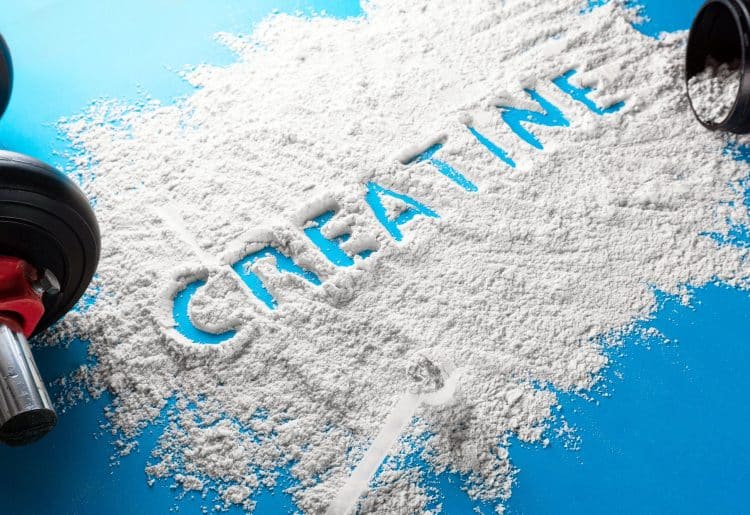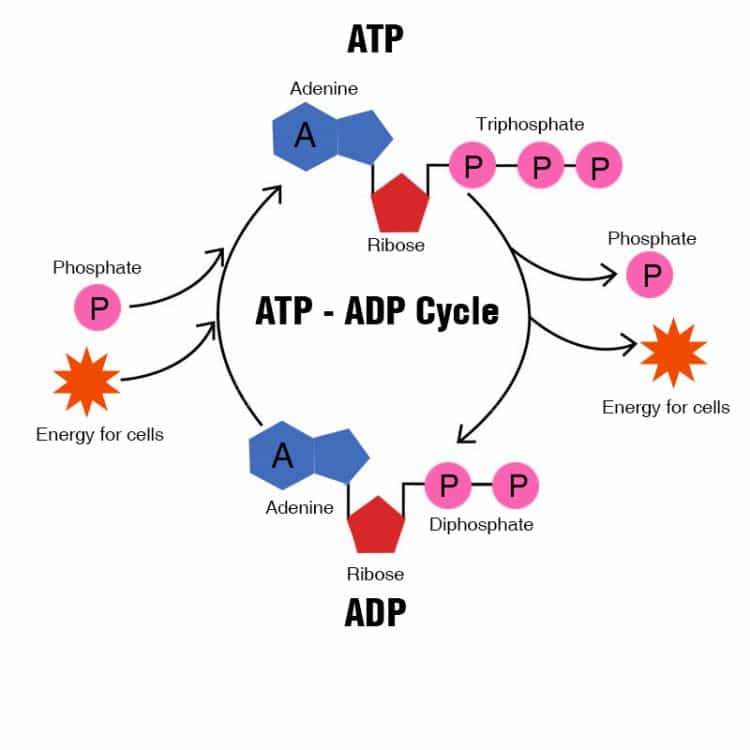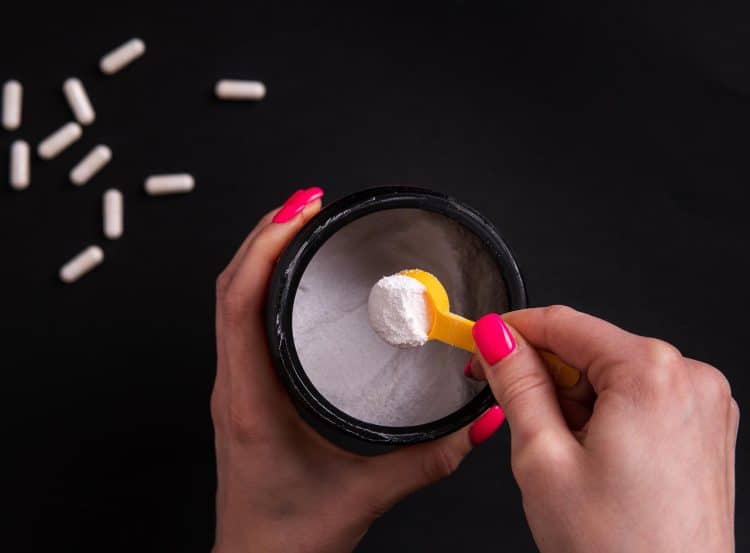What is Creatine?
Creatine is one of the most popular workout dietary supplements. Those who participate in sports, bodybuilding, or regular fitness routines experience many great benefits from consuming creatine.
Creatine is an amino acid derivative that we consume in red meat and seafood [1, 2]. Our bodies are also able to synthesize creatine in the kidneys and liver from amino acids glycine and arginine [1, 2]. Our bodies have creatine stores, where creatine is stored until it is needed. 95% of creatine is stored in skeletal muscle, while the remaining 5% is stored in the brain, liver, kidneys, and testes [2, 3].
Women’s creatine stores are slightly different than men’s due to the difference in body size and natural muscle mass, but the exact ratios are unknown [4].
Common Benefits of Creatine Supplementation

Athletic Performance and Muscle Strength
The main reason that people supplement creatine is to improve their athletic performance and increase muscle strength.
ATP (adenosine triphosphate) is the energy source that muscles use to contract during exercise [1, 4, 5]. After ATP is used for muscle contraction, ATP lets go of a phosphate and becomes ADP (adenosine diphosphate) [4, 5]. Since muscles need a continuous supply of ATP for repetitive muscle contractions, the body can resynthesize ATP by combining stored creatine with a phosphoryl group [2, 4, 5]. For explosive, high-intensity exercises, creatine stores may become depleted, which is where creatine supplementation comes in handy as it saturates the body’s creatine stores [2, 5].
Multiple studies show that creatine supplementation is effective in improving athletic performance and increasing muscle strength [1, 2, 3, 4, 6, 7, 8, 9, 10, 11]. Creatine supplementation can improve training tolerance, increase maximum effort, improve repetitive performance, improve endurance, and increase work capacity [1, 2, 3, 4, 6, 7, 8, 9, 10, 11].

Muscle Mass and Body Composition
Research shows promising evidence that creatine supplementation has the potential to increase muscle mass, as muscle strength and performance are improved [1, 2, 4, 6, 7, 8, 9, 10, 11].
Muscle mass increases are greater for men than women due to hormone differences [2, 7].
If you are concerned that creatine may make you gain weight, research shows that creatine does not cause weight gain [4, 7].
Exercise Recovery
Some research indicates that creatine supplementation before exercise may help protect muscle from injury and reduce the chances of muscle fatigue [2].
How Much Creatine Do I Need?
When you begin supplementing creatine, you should start with a loading phase. The loading phase consists of taking 5 grams (or 0.03 g/kg body weight) four times a day for approximately 5 to 7 days [2, 4, 12].
After you complete the loading phase, your muscles will be saturated, and you can continue supplementing a maintenance dose of 5 grams per day (or 0.03 g/kg body weight) [2, 12]. You can calculate how much creatine you need to take based on your body weight here: Creatine Calculator.
What Is The Best Time To Take Creatine?

Research is very limited on this topic, as only a handful of studies have been completed.
One study showed that creatine supplementation immediately before and after resistance training produced similar gains in muscle strength and muscle mass after supplementing for eight months [9]. However, when they compared results to the placebo group, they found that only post-exercise creatine supplementation increased lean body tissue mass and leg press strength [9].
Another study found that post-exercise creatine supplementation produced greater results in older adults, but they did not compare creatine supplementation to a placebo [9].
Most study results have limitations, as their participant groups are very small [10]. The most considerable study completed had 39 older adult participants who supplemented creatine and engaged in 32- weeks of resistance exercise 3 days a week [10].
They divided the participants into three groups: creatine supplementation pre-exercise, creatine supplementation post-exercise, and a placebo group, who took the placebo before and after exercise [10]. Both the pre and post-workout creatine supplementation groups had similar gains in strength, which were greater than the placebo group [10]. However, the group that supplemented creatine after their workouts experienced more significant increases in lean tissue [10]. But, there were no differences in the lean tissue gains between the pre-workout supplementation group and the placebo group [10].
The researchers concluded that the post-workout supplementation group experienced more significant grains because exercising increases blood flow in the skeletal muscle, which increases creatine transport in the muscles [10]. Another study found similar results in that post-workout creatine supplementation provided better results for recreational bodybuilders [11].
The most conclusive evidence points to post-workout supplementation being the best time to take creatine [9, 10, 11, 12]. However, the best timing is not precisely determined, and much more research needs to be done [12]. Most studies have only found that post-workout supplementation has increased lean mass, and research is lacking on the timing of creatine in relation to increases in strength or athletic performance [9, 12].
As mentioned, some researchers concluded that the reason post-workout creatine supplementation caused greater effects was because of increased blood flow in the muscle tissue after a workout, thus increasing the rate of creatine transportation [10]. Others have agreed that this may be the reason, but it is simply a theory that has not been studied [9].
The most recent research from 2022 suggests that the impact of timing on creatine supplementation may be dependent on the timing of creatine supplementation in combination with carbohydrate consumption [11]. Consuming creatine in combination with carbohydrates elevates creatine stores for a short-term duration [11]. Since this was not evaluated in previous research, the results of post-workout creatine supplementation being more beneficial are deemed weaker [11].
It is very hard to conclude the best time for creatine supplementation due to the limited amount of studies, which also had many limitations and did not account for all variables. Research shows that the timing of creatine supplementation, whether pre or post-workout, produces similar results that are close enough for it not to make a difference in overall effects.
FAQs
When is the best time to take creatine?
The best time to take creatine has not yet been determined. We know that both pre and post-workout creatine supplementation produces similar results, but most studies have had too many limitations to be conclusive. More research needs to be done.
Is creatine better in the morning or night?
You can take your creatine at any time, morning or night. Research has not determined the optimal time to take creatine. You can take it whenever it is more convenient for you.
Does it matter what time of day you take creatine?
It does not matter what time of the day you take creatine. No research guarantees the best time of day to take creatine for results. When your muscles are saturated with creatine, you will experience results no matter what time you take creatine.
Should I take creatine on a rest day?
Yes. You should take creatine on a rest day in order to maintain your creatine stores.
Is it ok to take creatine on an empty stomach?
You should avoid taking creatine on an empty stomach. It may cause stomach cramps. You may want to take your creatine supplements in combination with a carbohydrate since it increases your creatine stores capacity.
Learn more about Creatine:
- Creatine Before and After: How This Popular Supplement Affects Your Body
- 5 Best Natural Bodybuilding Supplements: Sculpt Your Body Into a Work of Art
- Creatine Pros and Cons: Cracking the Code
- Female Muscle Growth: Unleash Your True Potential
- How Long Until Pre-Workout Kicks In: A Guide to Maximizing The Supplement
- Creatine Powder vs. Pills — Which Should You Get?
- Does Creatine Expire? (The Ultimate Guide)
- How Long Does Creatine Stay in Your System—Explained
Wrapping Up
Overall, research points to post-workout creatine supplementation being superior to pre-workout supplementation for increased lean tissue mass, but much more research is needed on this topic for us to be able to state the optimal timing for creatine supplementation.
The good news is that no matter when you take creatine, you will experience benefits to some extent!
You can also rest assured that creatine supplements are generally a safe dietary supplement to take [1, 4]. Those who are pregnant, have bipolar disorder, kidney disease, or Parkinson’s disease should avoid taking a creatine supplement [1].
References
- Medline Plus. (2021, October). Creatine: MedlinePlus Supplements. https://medlineplus.gov/
- Kreider, R. B., Kalman, D. S., Antonio, J., Ziegenfuss, T. N., Wildman, R., Collins, R., Candow, D. G., Kleiner, S. M., Almada, A. L., & Lopez, H. L. (2017). International Society of Sports Nutrition position stand: safety and efficacy of creatine supplementation in exercise, sport, and medicine. Journal of the International Society of Sports Nutrition, 14(1). https://doi.org/10.1186/s12970-017-0173-z
- Cooper, R., Naclerio, F., Allgrove, J., & Jimenez, A. (2012). Creatine supplementation with specific view to exercise/sports performance: an update. Journal of the International Society of Sports Nutrition, 9(1). https://doi.org/10.1186/1550-2783-9-33
- Smith-Ryan, A. E., Cabre, H. E., Eckerson, J. M., & Candow, D. G. (2021). Creatine Supplementation in Women’s Health: A Lifespan Perspective. Nutrients, 13(3), 877. https://doi.org/10.3390/nu13030877
- Rasmussen, C. J. (2008). Nutritional Supplements for Endurance Athletes. Nutritional Supplements in Sports and Exercise, 369–407. https://doi.org/10.1007/978-1-59745-231-1_11
- Roschel, H., Gualano, B., Ostojic, S. M., & Rawson, E. S. (2021). Creatine Supplementation and Brain Health. Nutrients, 13(2), 586. https://doi.org/10.3390/nu13020586
- Brenner, M., Rankin, J.W., Sebolt, D. (2000). The Effect of Creatine Supplementation During Resistance Training in Women, Journal of Strength and Conditioning Research: May 2000 – Volume 14 – Issue 2 – p 207-213
- Ferguson, T. B., & Syrotuik, D. G. (2006). Effects of Creatine Monohydrate Supplementation on Body Composition and Strength Indices in Experienced Resistance Trained Women. The Journal of Strength and Conditioning Research, 20(4), 939. https://doi.org/10.1519/r-18485.1
- Forbes, Scott & Waltz, Xavier & Candow, Darren. (2014). Creatine timing on muscle mass and strength: Appetizer or Dessert?. Agro Food Industry Hi Tech. 25. 19-22. https://www.researchgate.net
- Candow D.G., Vogt E., Johannsmeyer S., Forbes S.C., Farthing J.P. Strategic creatine supplementation and resistance training in healthy older adults. Appl. Physiol. Nutr. Metab. 2015;40:689–694. doi: 10.1139/apnm-2014-0498Ribeiro, F., Longobardi, I., Perim, P., Duarte, B., Ferreira, P., Gualano, B., Roschel, H., Saunders, B. (2021). Timing of Creatine Supplementation around Exercise: A Real Concern? Nutrients. 13(8): 2844. https://doi.org/10.3390/nu13082844
- Candow, D. G., Forbes, S. C., Roberts, M. D., Roy, B. D., Antonio, J., Smith-Ryan, A. E., Rawson, E. S., Gualano, B., & Roschel, H. (2022). Creatine O’Clock: Does Timing of Ingestion Really Influence Muscle Mass and Performance? Frontiers in Sports and Active Living, 4. https://doi.org/10.3389/fspor.2022.893714
- Antonio, J., & Ciccone, V. (2013). The effects of pre versus post-workout supplementation of creatine monohydrate on body composition and strength. Journal of the International Society of Sports Nutrition, 10(1). https://doi.org/10.1186/1550-2783-10-36


